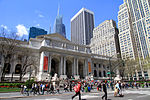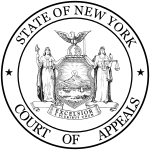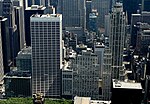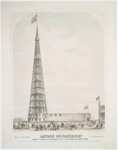New York Public Library Main Branch

The Stephen A. Schwarzman Building, commonly known as the Main Branch or the New York Public Library, is the flagship building in the New York Public Library system in the Midtown Manhattan neighborhood of New York City. The branch, one of four research libraries in the library system, contains nine separate divisions. The structure contains four stories open to the public. The main entrance steps are at Fifth Avenue at its intersection with East 41st Street. As of 2015, the branch contains an estimated 2.5 million volumes in its stacks. The building was declared a National Historic Landmark, a National Register of Historic Places site, and a New York City designated landmark in the 1960s. The Main Branch was built after the New York Public Library was formed as a combination of two libraries in the late 1890s. The site, along Fifth Avenue between 40th and 42nd Streets, is located directly east of Bryant Park, on the site of the Croton Reservoir. The architectural firm Carrère and Hastings constructed the structure in the Beaux-Arts style, and the structure opened on May 23, 1911. The marble facade of the building contains ornate detailing, and the Fifth Avenue entrance is flanked by a pair of stone lions that serve as the library's icon. The interior of the building contains the Main Reading Room, a space measuring 78 by 297 feet (24 by 91 m) with a 52-foot-high (16 m) ceiling; a Public Catalog Room; and various reading rooms, offices, and art exhibitions. The Main Branch became popular after its opening, and saw 4 million annual visitors by the 1920s. It formerly contained a circulating library, though the circulating division of the Main Branch moved to the nearby Mid-Manhattan Library in 1970. Additional space for the library's stacks was constructed under adjacent Bryant Park in 1991, and the branch's Main Reading Room was restored in 1998. A major restoration from 2007 to 2011 was underwritten by a $100 million gift from philanthropist Stephen A. Schwarzman, for whom the branch was subsequently renamed. Since 2018, the branch has been undergoing an additional expansion. The Main Branch has been featured in many television shows and films.
Excerpt from the Wikipedia article New York Public Library Main Branch (License: CC BY-SA 3.0, Authors, Images).New York Public Library Main Branch
5th Avenue, New York Manhattan
Geographical coordinates (GPS) Address Website External links Nearby Places Show on map
Geographical coordinates (GPS)
| Latitude | Longitude |
|---|---|
| N 40.753055555556 ° | E -73.981944444444 ° |
Address
New York Public Library (The Humanities And Social Sciences Library;Stephen A. Schwarzman Building)
5th Avenue 476
10018 New York, Manhattan
New York, United States
Open on Google Maps











